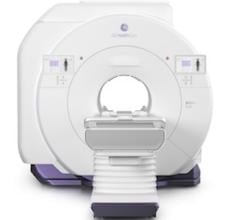
Shuo Li, image courtesy of Case Western Reserve University
January 4, 2024 — Diagnosing cancer today involves using chemical “contrast agents” to improve the accuracy of medical imaging processes such as X-rays as well as computed tomography (CT) and magnetic resonance imaging (MRI) scans.
But those agents can be expensive, take more time to use and pose potential health concerns.
With a new four-year, $1.125 million grant from the National Science Foundation (NSF), researchers at Case Western Reserve University hope to develop an artificial intelligence (AI) alternative that generates virtual contrast-enhanced images without chemical agents.
Their goal: a safer, quicker and cheaper process using non-contrast images only.
“With this grant, our multidisciplinary team aims to improve the medical-imaging process for clinical staff and patients,” said project leader Shuo Li, an associate professor at the university’s Case School of Engineering (CSE). “Virtual contrast-enhanced imaging could save time and money while continuing to provide the best care to patients.”
Vipin Chaudhary, the Kevin J. Kranzusch Professor and chair of computer and data sciences at CSE; Leonardo Kayat Bittencourt, an associate professor at the School of Medicine and vice chair of innovation in radiology at UH Cleveland Medical Center; and Sree Harsha Tirumani, an associate professor at the School of Medicine and vice chair for clinical research in radiology at UH Cleveland; are co-leading the project. Li, Kayat and Tirumani are all members of the Case Center for Imaging Research.
The challenge
While the use of chemical contrast materials is the gold standard for diagnosing many diseases, increasing numbers of patients, associated costs and potential side effects pose significant challenges. While uncommon, risks to patients include allergic reactions and other short-term adverse reactions.
A new non-chemical imaging technique could reduce such risks while also saving time and money. Such a technique could also help alleviate burdens of potential supply chain issues, such as the global shortage of iodinated contrast media in 2022.
The project
The project leverages the engineering and medical strengths of the research team to develop this new, virtual way of providing valuable diagnostic information to the clinician and patient, but without chemical contrast agents.
The researchers will investigate a new category of image features to inform development and validation of new models for use with MRI scans. Leveraging key technical strengths of AI, the researchers are developing a technique called an AI contrast agent.
The grant is funded through the NSF Smart Health and Biomedical Research in the Era of Artificial Intelligence and Advanced Data Science, an interagency program to support advances in computer and information science, engineering, mathematics, statistics, behavioral and cognitive research for biomedical and public health.
For more information: www.case.edu


 February 20, 2026
February 20, 2026 









